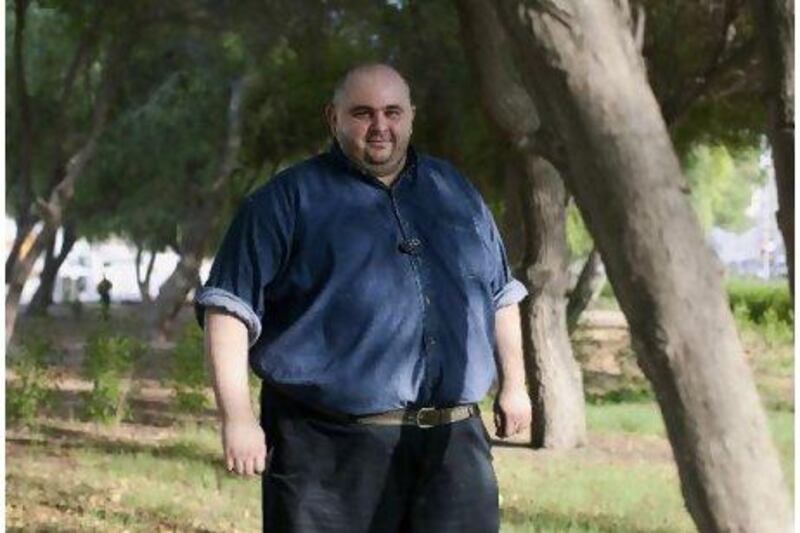ABU DHABI // Salma M was in the fifth grade when she began to gain weight, marking the start of a time that would leave scars to this day.
"Everyone would make fun of me, especially the popular girls," says Salma, now 26.
Changing schools did not help.
"A new girl, who was skinny and very popular, started to bully me," she says. "We were in class and the same girl said: 'Don't you hear me, why don't you fix your hair? Don't you have a brush?'" Salma says.
"She then picked up a chair and threw it right at me."
It was stories such as Salma's that moved Wail Huneidi into action. Mr Huneidi, 35, a sales representative at Emirates Steel and a father of two, decided to launch an anti-bullying campaign after becoming aware of the problem through newspaper articles.
"When I started reading more I realised how serious and dangerous this issue is to all children, teens and individuals, and how much it affects society," he says.
"It was shocking to realise that a lot of people who suffered in our world from bullying as children still hold that pain inside them when they're adults."
The main problem is children often don't recognise when they are being bullied, Mr Huneidi says.
Salma agrees: "I didn't know what was going on and didn't understand that this was even a problem. I thought something was wrong with me and this was just what I was destined to be."
As a parent of a girl aged 4 and a boy aged 2, Mr Huneidi is horrified his children could become targets for this sort of vicious behaviour.
"I wouldn't want them to grow up not knowing what this subject is," he says. "I feared for my own kids."
Mr Huneidi launched the first local anti-bullying website, thebullying.ae, tackling the issue in Arabic and English.
With the help of international groups including Bully Free Zone in the UK and Bully Solutions in the US, Mr Huneidi put together an informative site that educates visitors on how to recognise bullying and how to combat it.
The international organisations, he says, "were impressed that someone in this part of the world was pursuing such an initiative. They said they were willing to support me in all my future projects".
Mr Huneidi is now working with the Ministry of Education and the Community Police Department to implement programmes and lectures in schools, and distribute leaflets and brochures in shopping centres and other public places. "We want to train both teachers and parents," he says. "They have responded positively at this point and I'm scheduled to have meetings with both."
Apart from the programmes in schools, Mr Huneidi plans to send 20,000 anti-bullying text messages to members of the community and launch a hotline for children who feel they are victims of bullying.
Dr Yousef Abou Allaban, a medical director and consultant psychiatrist at the American Center for Psychiatry and Neurology, explains the damage bullying can leave.
"It can create anger," Dr Abou Allaban says. "It may lead to depression, hopelessness and in some cases even suicide."
Bullying can also lead to psychological trauma, such as post-traumatic stress disorder.
Dr Abou Allaban says there are a number of solutions, such as mediation between the bully and victim, and support groups.
"If a victim sees that he or she has resources for support it will help give them strength," he says. "The most important thing is for them to understand that they are not alone." Preventative measures include enforcing anti-bullying laws, holding school conferences on the problem and emphasising the consequences of hurting others.
That is just what Mr Huneidi plans to do, although he realises it will be a long road. "One of the hardest parts of this campaign is trying to find information about this in the Arab world," he says.
"It is almost non-existent; something I find really disturbing - that such an important subject, a life-threatening one, has little or no recognition in the Arab world where it so prominently exists."
Case Study:
In the ninth grade, after nearly four years of torment, Salma M decided to change her appearance.
It was hard for such a young woman to realise the onus for the bullying should not fall on her shoulders; that there was nothing wrong with her.
“I would discover notes in my locker and backpack reading: ‘You fatty, don’t you look into the mirror before you leave the house?’ or ‘Why don’t you do something about your hair?’” she says.
“I started realising that maybe if I lost weight and changed my outer appearance, all this would end.”
Salma says the bullying decreased after she lost some weight but she continued to be a target of the girl who had been harassing her from day one.
“She made it a point to embarrass me in front of others,” she says.
In grade 10, as Salma was preparing for her final exams, the abuse took a toll on her health.
“On my way to school I passed out and was taken to the hospital,” she says. “I had to take my exams while I was in a wheelchair.”
For a second time, Salma changed schools and tried to start anew. Although she altered her appearance, the trauma affected her psychologically and emotionally. She still suffers from being bullied.
“Every time I pass by a group of people and see that they’re laughing, I immediately think they’re laughing at me,” she says.
“And since the girl who bullied me all those years also stole my best friend, I’m so afraid to introduce my friends to one another, fearing that one day they may gang up on me.”
Preventative measures need to be introduced to schools, with reliable resources for students, Salma says.
“Although bystanders wouldn’t add to the bullying, they wouldn’t do anything to stop it either,” she says. “The silence can be just as harmful.”






